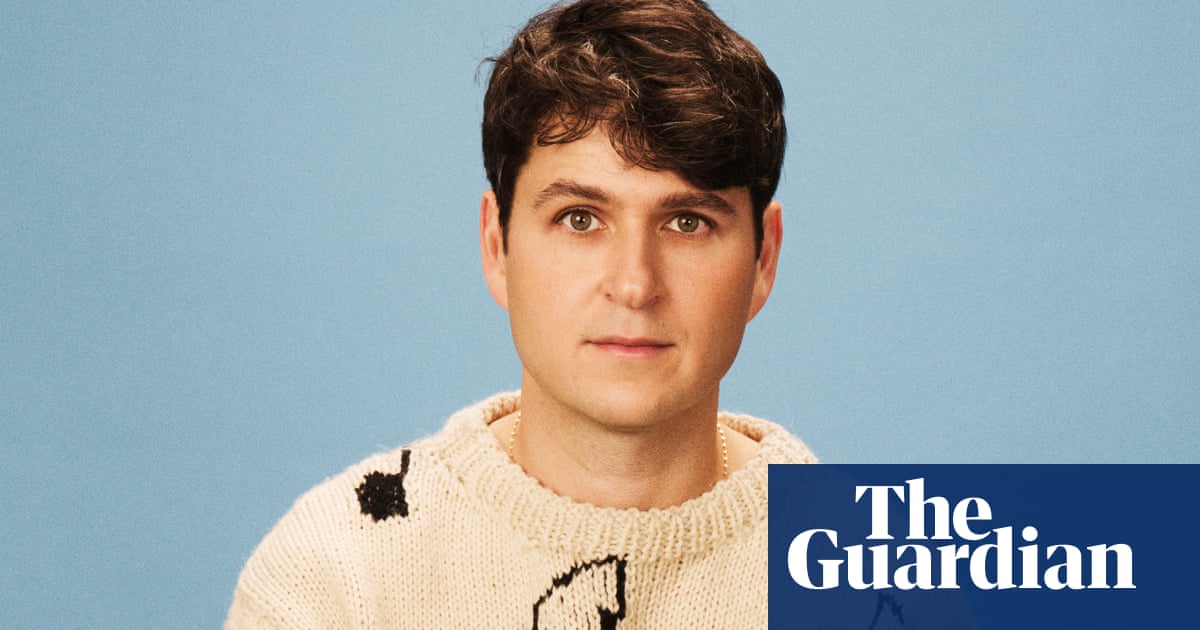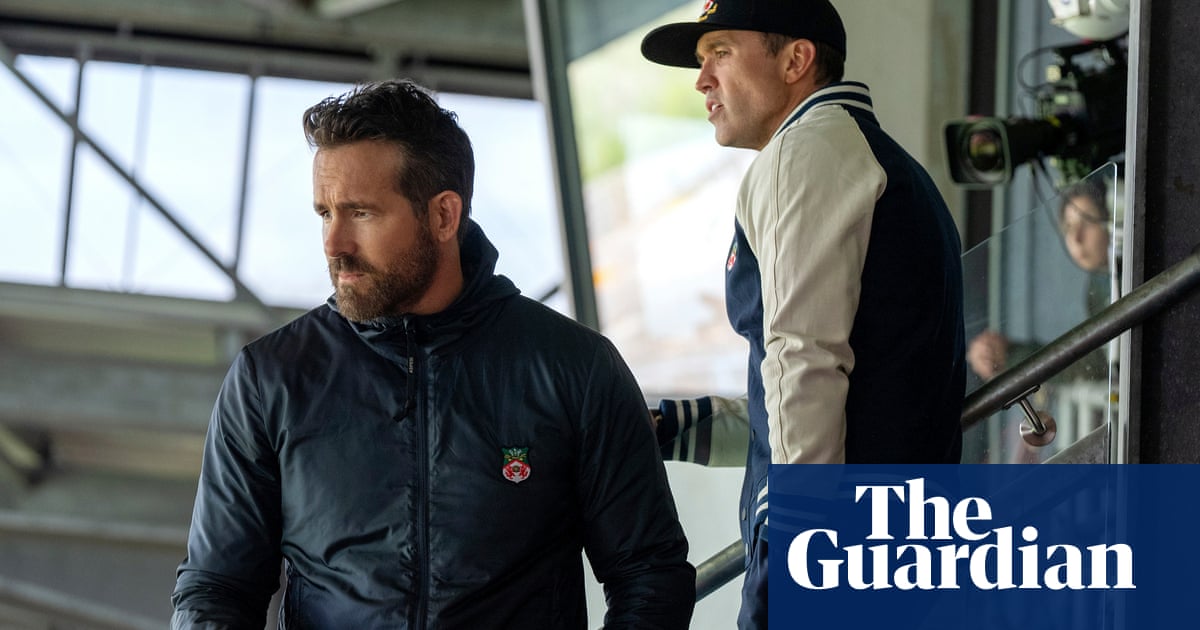
lthough it belongs to one of the creators of depraved sitcom It’s Always Sunny in Philadelphia, there is nothing particularly funny about Rob McElhenney’s office, a bland, sparsely decorated room in the corner of a bungalow on the CBS studio lot in Los Angeles. As I wait for him to arrive, in the last days before the coronavirus pandemic shuts down productions across Hollywood, my eyes are drawn to the only unusual feature in the room: a doorbell-sized button built into the desk.
A moment later McElhenney breezes in, walks behind the desk and presses it. Across the room, the door swings silently closed. “When we saw it,” he says, grimacing as he takes a seat on the couch, “we were like: ‘Oh God, this is from a bygone era.’” It’s the sort of sinister tech Always Sunny’s creepy Dennis might employ; indeed, the same kind of button wascited in the 2017 sexual assault allegations against former NBC news anchor Matt Lauer.
Megan Ganz, co-creator of McElhenney’s new show for Apple, Mythic Quest: Raven’s Banquet, found an identical button in her office next door. “We were making jokes about how wholly inappropriate they are, but then Meg was like: ‘I use it all the time!’ You realise the button that closes the door is not the issue. The one that locks the door, that’s the problem.”
McElhenney is well aware of the way bullying, predatory men have too often been protected by their own power. “This particular industry is so fraught with stories of people being so fucking awful,” he says. “At some point, somebody used that [button] for nefarious purposes. There’s this misconception, and it’s being eradicated right now, but for years it was just a rite of passage for people to have to weather these storms of terrible behaviour. It doesn’t have to be that way.”
Questions about the role traditional masculinity plays in the workplace are at the heart of Mythic Quest, which centres on the team behind a massively popular online fantasy game. McElhenney plays an egomaniacal, bushy-bearded game creator named Ian (pronounced Iron) Grimm who constantly butts heads with long-suffering lead engineer Poppy Li (Charlotte Nicdao). The seed of the show was planted when Ubisoft, the gaming giant that develops Assassin’s Creed, approached McElhenney about making a TV show. At their offices in Montreal he met a game designer who, when McElhenney asked what he did, replied after an uncomfortably long pause: “I build worlds.”
Since the show first aired, McElhenney has been contacted on social media by a number of game developers who all assumed that they alone were the inspiration for the preening buffoon. “I thought that was really funny,” he grins. “First, that they would own up to that, and second, because he has a very specific look, and the guys all look very, very similar. Of course it’s not a real person. He’s a ridiculous version of an actual human being.”
With Mythic Quest, he wanted to explore the tension between the game developer as the driving force behind a game, and the reality that, like making a TV show, building a game is an intensely collaborative process. “As humans we like this idea that there’s one person solely responsible for everything. Because of the human ego’s desire for glorification, people step into the spotlight and say: ‘Yeah, that’s me.’ I don’t have to draw parallels to the situation we have in this country now, but it’s fairly obvious there’s a cult of personality that Americans specifically are driven to adore.”
McElhenney is self-aware enough to see some of these traits in himself. Always Sunny, he points out, would never have existed had he not moved to Los Angeles “fuelled by privilege, true privilege, and the ignorance and testosterone of a 25-year-old white dude. The world was my oyster, and I felt that way even though I grew up poor and didn’t know anybody in Hollywood.”
Born in Philadelphia in 1977, McElhenney was a scrawny child who at 13 weighed just 87lb. He credits his Jesuit education for helping him productively channel his teenage aggression, but says he was never class clown. “I’m in a text chain with my friends from high school and I’m not even the third funniest person,” he says. “It is astonishing to them, having known me for ever, that I’m in this position. I was never the funny guy.”
What he did have was an obsessive love of television. “I grew up watching immense amounts of it,” he explains, “so I’m a student of the form.” He started out as an actor in New York, but when he struggled to find parts his agent suggested he write. His first script – a dark Scorsese homage – was optioned by Taxi Driver writer Paul Schrader, but never produced.
After moving to Hollywood, McElhenney wrote a scene in which a character, on hearing a friend say they have cancer, can’t get away fast enough. He took the scene to the two people he thought could make it work, Charlie Day (“One of the funniest people alive”) and Glenn Howerton (“He does something I’ve never seen before: take Ted Bundy and make him comic”). Always Sunny spawned from their dynamic, boosted by Kaitlin Olson, whom McElhenney married in 2008 and describes as “hands down the funniest woman on television”. Their network, FX, insisted they add Danny DeVito to the cast in the second season to boost abysmal ratings. With the gang assembled, the show began to reach cult status, becoming what McElhenney dreamed it could be, a monstrous inversion of Friends’ mantra: ‘I’ll be there for you.’ “Everybody is narcissistic to a certain extent, but we have governors in our brains and hearts that don’t allow us to act that way,” he says. “What happens if five people who don’t have that find each other? You create the confluence of narcissism, evil and sociopathic behaviour that is Sunny.”
Fifteen years later, Always Sunny is now the longest-running live-action sitcom on air, yet it retains the capacity to shock. That is down to McElhenney’s determination to keep subverting expectations, not least with his own physical transformations that make a mockery of the idea that sitcom characters enter a form of stasis. For the show’s seventh season, he piled on 22kg (48lb) by adopting a strict regimen of nighttime cottage cheese, then for the 13th he hired Channing Tatum’s Magic Mike trainer Arin Babaian to get him into superhero shape. The latter’s pay-off came in a remarkable season finale, in which McElhenney performs a moving five-minute interpretative dance routine as a way for his character Mac to come out to his incarcerated father. The joke is there is no joke. After years of being set up to expect grotesque catastrophe, the last thing you expect from Always Sunny is heartfelt sincerity.
“Maybe that scene goes back to not thinking of myself as being funny,” he offers. “My approach becomes: I’m going to deliver something unexpected, and hope that’s where the comedy comes from. With Sunny we never say: ‘What’s going to be profane?’ It’s: ‘What’s nobody else doing?’”
It was also a way for McElhenney, whose parents separated when he was eight after his mother began a relationship with a woman, to send a message to the show’s gay fans. “When Mac came out of the closet, it got an amazing response from the LBGTQ community that I did not expect,” he says. “I didn’t realise so many fans of Sunny were not only members of the community, but thought of Sunny as a true advocate.”
Mythic Quest is also in the business of subverting expectations. After quickly establishing itself as a witty workplace sitcom, the show pulls the rug in its much-talked-about fifth episode, Dark Quiet Death, which distills the show’s themes into a stand-alone episode about creativity, commerce and compromise. It revolves around the titular game in which players can never win but only prolong their inevitable demise – much like life. “I’m not a morbid person, but I think about death all the time,” says McElhenney. “Sometimes the meaninglessness is liberating, and sometimes it’s devastating. I navigate through life like that.”
The episode is a formally inventive and sophisticated piece of storytelling, but McElhenney shrugs it off by saying that in the age of streaming, showrunners no longer have any excuse not to push beyond old established limits. “It’s just theft,” he says, with a laugh. “You look at what Master of None did, what Donald [Glover] does with Atlanta, what Phoebe Waller-Bridge does, and you’re like: ‘Oh, wow, there’s no more rules.’”
It’s hard to believe the anarchic mind behind Always Sunny ever felt confined by rules. With Mythic Quest he has crafted another sharp, funny show that asks pertinent questions about these trying times, and which explores the positive aspects of masculinity along with those clearly toxic ones. When the first episode of Always Sunny aired, McElhenney was 28 and the youngest showrunner in Hollywood. Now, at 42, he says he seeks out writers who’ll tell him: “‘Hey, old man, it’s not like that any more.’” Unlike the relic on his desk, he is looking firmly to the future.
Mythic Quest: Raven’s Banquet is available to stream on Apple TV+












